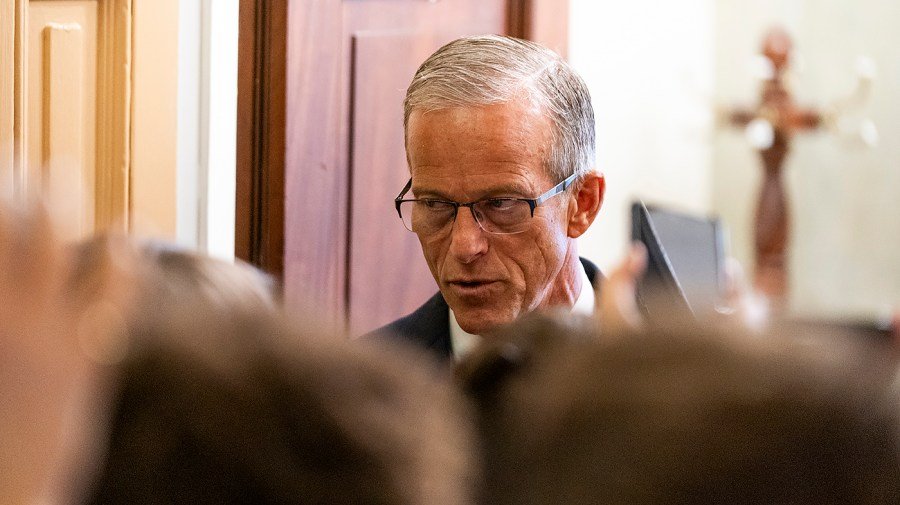
Senate Republicans are ramping up pressure on Democrats over the shutdown, taking away a vote on a Democratic alternative to open the government and blaming the party for worsening hardships for military families.
In a now familiar scene Tuesday night, the Senate rejected a House GOP measure to open the government by a 49-45 vote. Sen. Catherine Cortez Masto (D-Nev.) and Sen. Angus King (I-Maine) were the only members of the Democratic caucus who voted to advance it. Sen. John Fetterman (D-Pa.), who previously supported it, missed the vote.
No Democrats shifted from their previous position, but the vote was different in one key way.
Until this week, Senate Majority Leader John Thune (R-S.D.) has allowed Democrats to easily schedule votes on their competing funding proposal. But with the shutdown entering its third week, he’s deploying tougher tactics.
Thune, for the first time since the government shut down, scheduled only one vote to reopen the government, denying Democrats an opportunity to vote on their own government funding proposal, which to this point has provided political cover to swing-state members of their caucus.
He and other GOP leaders blasted Democrats on Tuesday for hurting military families after setting up the vote before the critical Oct. 15 payday for more than 1 million military service members, a critical constituency in both Republican and Democratic states.
Thune slammed Senate Democratic Leader Chuck Schumer (D-N.Y.) for being more concerned about partisan politics than the welfare of military families.
“I guess Democrats are not going to be satisfied until military families and government workers are lining up at food banks or simply charging necessary items like milk and bread on their credit cards.
“While military families and government workers may be deeply stressed, at least life is getting better every day for Senate Democrats,” he added, making reference to Schumer’s statement last week that “every day gets better for us.”
Schumer’s remarks reflected his view that Democrats are winning the messaging battle over who’s to blame for the shutdown.
Thune also pointed out that “law enforcement officers” are “going without pay.”
New York is home to more than 28,000 active-duty service members, more than 9,000 active-duty spouses and more than 14,000 active-duty children. Fort Drum in New York is home to the Army’s 10th Mountain Division and is a major engine of economic growth in upstate New York.
The strategy is aimed at putting pressure on Sen. Jon Ossoff (D-Ga.), the most vulnerable Senate Democrat of the 2026 midterm election cycle, whose home state includes Fort Benning, which supports more than 12,000 active-duty service members, 19,000 military trainees and 26,000 family members.
Ossoff has repeatedly voted for the Democratic alternative to fund the government through Oct. 31 and extend the enhanced health insurance premium subsidies that are due to expire at the end of the year. That has given him some political cover to vote repeatedly against the House-passed government funding stopgap.
Senate Republican Whip John Barrasso (Wyo.) read aloud a Military Times headline on the Senate floor, highlighting reporting that “military families seek out food assistance during shutdown anxiety.”
He said military families are “lining up at food banks.”
Ossoff told The Hill that House Republicans deserve blame for the shutdown because they left Washington in September and don’t plan to return to town anytime soon.
Thune set the stage for this week’s vote on the House-passed continuing resolution by keeping the Senate in late to pass the annual defense authorization bill, which included a pay raise for military members.
The strategy was to underscore the argument that Republicans are making national defense a top priority while Democrats are playing a risky game by keeping the government shut down for two weeks to win concessions on expiring Affordable Care Act premium subsidies and Medicaid spending, according to a GOP senator familiar the planning for this week’s vote.
The Republican senator, who requested anonymity to discuss conference strategy, said “there’s been a little movement” among centrist Democrats who are growing uncomfortable about the length of the shutdown and the lack of a clear off-ramp from the stalemate.
The senator said the strategy behind forcing Democrats to vote again on the House-passed funding bill without the option of voting instead of a competing proposal is to make it a “completely binary” choice of whether to vote to reopen the government or keep it closed.
“We have a binary choice on the day when the military gets paid or not,” the lawmaker added.
Democrats still have another opportunity to vote on a procedural motion to advance their competing government funding plan, but Thune is no longer letting them vote at will on the measure.
Democratic aides dismissed the Republican floor strategy Tuesday as ineffective, pointing out that Democratic senators such as Ossoff have already voted seven times to advance their alternative funding bill. They argue that continuing to vote on their own continuing resolution isn’t likely to produce much more political benefit.
Another target of the Republican pressure campaign is Sen. Mark Warner (D-Va.), who faces a potentially competitive reelection race next year. His state is home to the Navy’s sprawling base in Norfolk, one of the largest naval bases in the world.
President Trump stepped into the fray by announcing Saturday that he had directed Defense Secretary Pete Hegseth to use “all available funds to get our Troops PAID” on Oct. 15, despite the shutdown.
Some Democrats immediately questioned whether Trump had the legal authority to redirect congressionally appropriated funding to make sure members of the military don’t miss a pay check.
Rep. Jim Himes (D-Conn.) told CBS’s “Face the Nation” on Sunday that Trump’s directive was “probably not” legal.
“I think to pay the military during the shutdown would require legislation; the Speaker of the House has taken that off the table,” he said, referring to the decision by House GOP leaders not to reconvene the lower chamber during the shutdown.
Republican leaders, however, feel confident that if Democrats try to block funding for military pay, it would backfire on them politically.
Speaker Mike Johnson (R-La.) dared Democrats on Tuesday to challenge Trump’s order to take care of military members and their families.
“If the Democrats want to go to court and challenge troops being paid, bring it. OK,” he said during a press conference at the Capitol.






